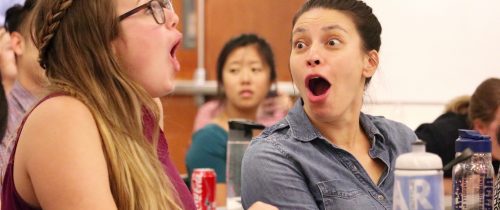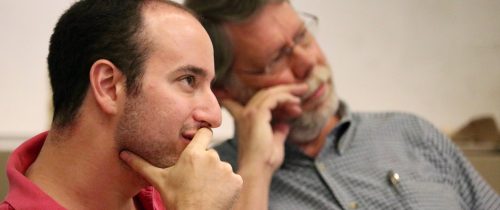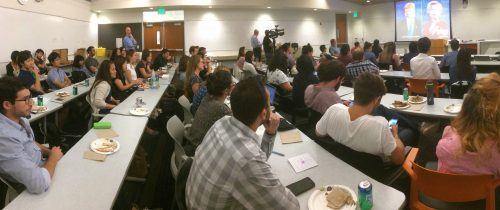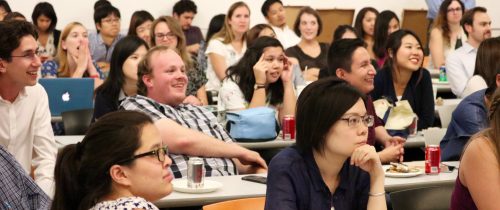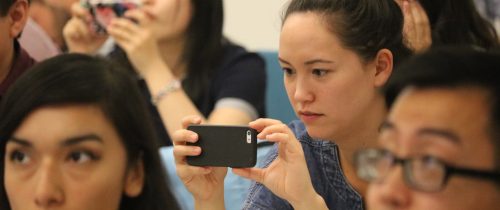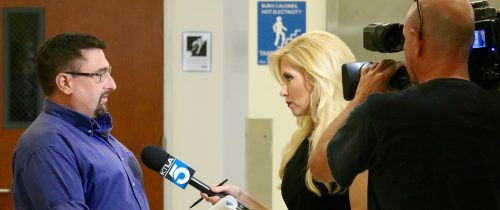By Les Dunseith
The more than 50 Public Policy students who gathered Monday night at the UCLA Luskin School of Public Affairs to watch the first presidential debate had an opportunity to see their political studies play out in real time as an election that has repeatedly defied expectations again seized the public spotlight.
With a reporting team from KTLA Channel 5 on hand to cover the students’ reactions, Public Policy chair Mark Peterson set the stage beforehand by noting the intense public interest in this debate and reminding students of Donald Trump’s recent dramatic surge in political polls. Peterson speculated about how the debate was likely to play out.
“Is Donald Trump going to get red-faced and throw insults at Hillary Clinton? Is she going to get defensive?” Peterson said. “Of all the single events that exist in the election process, we are watching tonight one that may — may — have the potential to move the numbers.”
Well-versed in policy issues, the students knew going in that Clinton would probably show a better grasp of details. Trump, on the other hand, was more likely to be bombastic and speak in generalities. Both would blame the other for the nation’s problems. It would get testy. Insults were likely.
The results did not disappoint. And, in the students’ minds, the debate had a clear winner.
“It was Hillary Clinton,” first-year MPP student Estafania Zavala told KTLA’s Mary Beth McDade after the debate had ended. “She was reasonable. She was skeptical of the things that Trump was saying. She never lost her cool.”
Tony Castelletto, a second-year MPP candidate, agreed that Clinton had the advantage. “Basically, she won it just by being the only adult on stage.”
That kind of skepticism about Trump and his debate performance was shared by other students during the viewing, which, at times, sounded more like a raucous Super Bowl party than a serious-minded political discussion. The room frequently filled with laughter — much of it derisive of Trump — as the candidates sparred around questions and traded quips.
The controversial and combative style that served the Republican candidate well in building fervent support among voters in the primaries did not play well with these Luskin students from diverse cultural and ethnic backgrounds. It also didn’t win Trump favor with former Bernie Sanders supporters, who filled half the room, second-year student Reid Meadows speculated. Yet Meadows, a longtime Clinton supporter, was uncertain about how other voters might respond to the debate.
“I think to a lot of people who aren’t studying politics on a regular basis, it might come off like Donald Trump won it,” Meadows told KTLA.
Zavala, who described herself as less of a Clinton supporter and more of a Trump opponent, said she was surprised by how well Clinton handled herself in the debate. “Clinton was a lot more honest, more humorous, more human than I expected her to be,” she said.
Peterson saw the debate viewing as a valuable learning experience for Public Policy students. “Our MPP students are dedicating their professional lives to careers in public service informed by facts, evidence and analysis, but they know their opportunities for action will also be shaped by the contest of ideas, emotions and values in the political process, often most sharply drawn in the race for the White House,” he said. “What better way for policy students to witness and assess these forces than to have the shared experience of watching and talking together about the crucible of a presidential debate?”
The prevailing conclusion of students milling about after the debate was that Clinton had successfully kept Trump on the defensive. Her air of mild exasperation in reaction to many of Trump’s statements was an effective approach for the setting, they said.
Regarding Trump, however, Peterson noted that it is a challenge for anyone, even political experts like himself, to judge Trump’s debate performance because his approach is so different from that of previous presidential candidates. “We just haven’t had this kind of candidate, or personality, as we have in Donald Trump.”
Overall, the debate held few surprises for Peterson.
“Some of it was what I expected in that it was pretty harsh,” he said. “Hillary Clinton, the longtime politician, was trying to stay within the boundaries of what had been established for the debate. And Donald Trump was trying to push those boundaries and be disruptive.”
Ultimately, it will take awhile before the debate’s results are fully understood.
“Donald Trump was the wild card going into this,” Peterson said. “He, on the one hand, showed somewhat more self-discipline than one might have imagined. At the same time, there was the real Donald Trump there — in your face, interrupting, making certain kinds of characterizations and comments that one would not normally see in a presidential debate. We’ll have to see how the American public reacts to that.”
